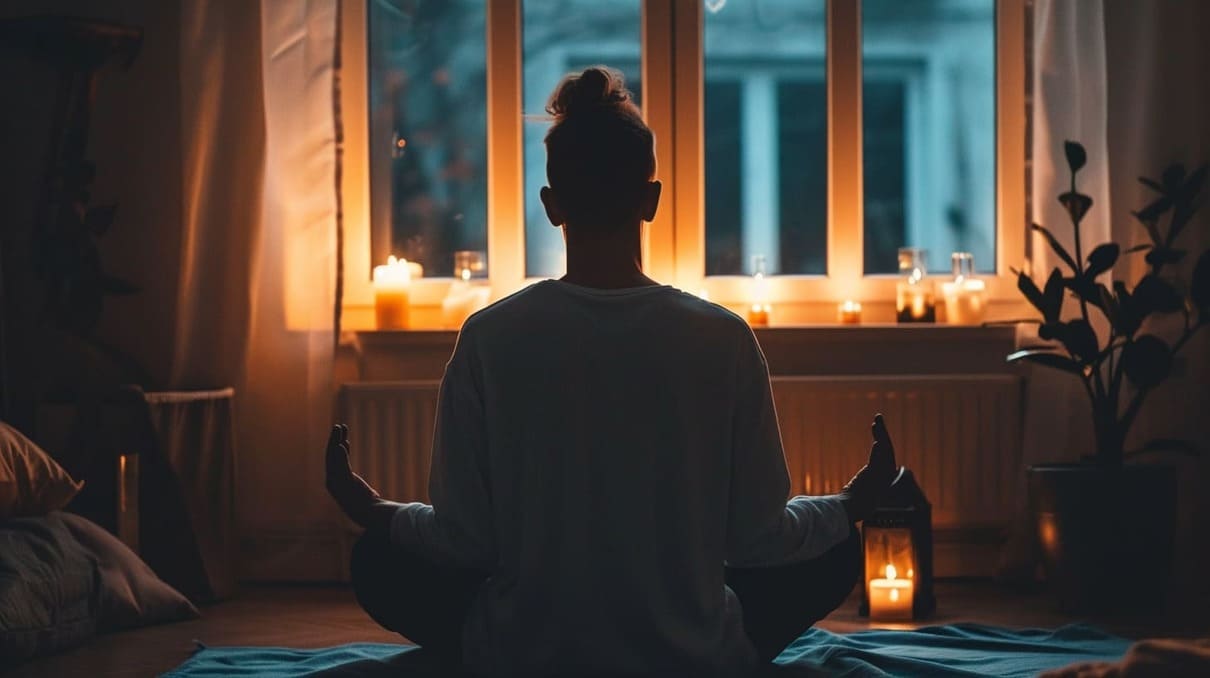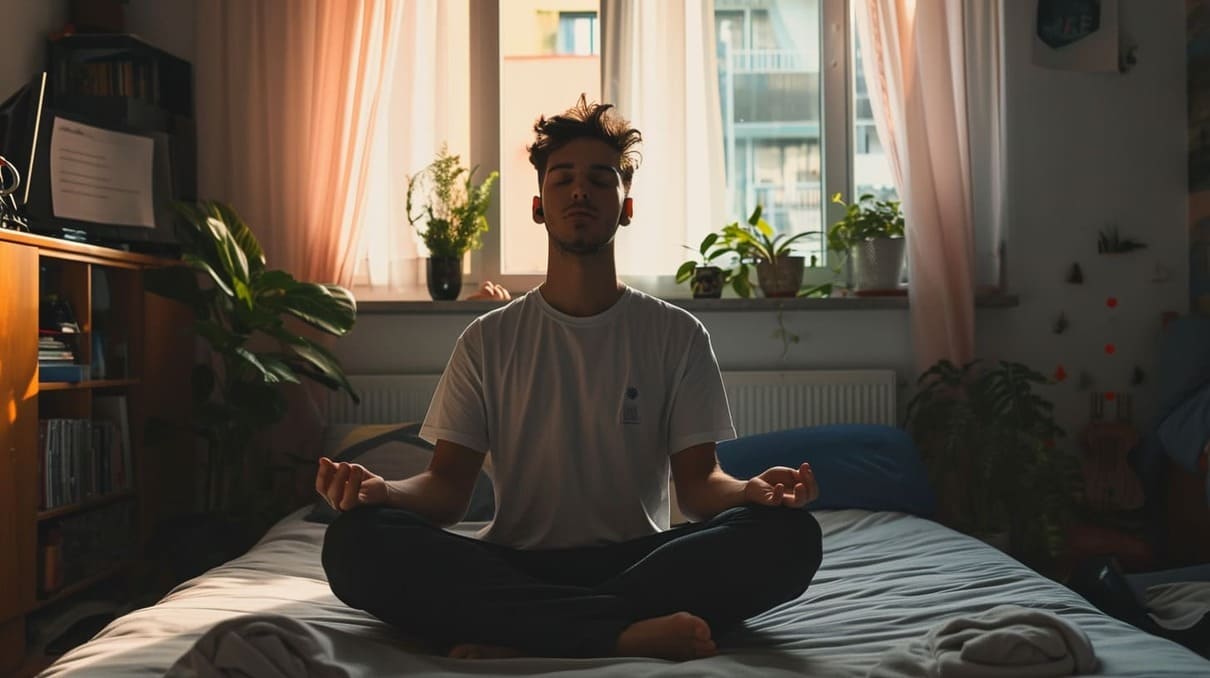In today’s fast-paced world, many of us struggle to find peace and relaxation amidst the chaos of daily life. There is a powerful tool that has been used for centuries to help calm the mind, reduce stress, and promote better sleep – meditation.
In this comprehensive guide, we will explore the benefits of meditation for sleep and anxiety, as well as the different types of meditation techniques that can be particularly effective for addressing these common issues.
We will delve into the science behind how meditation can help with sleep and anxiety, as well as provide practical tips and techniques for incorporating meditation into your daily routine. Whether you are looking to improve your sleep quality, reduce stress, or simply enhance your overall well-being, this article will equip you with the knowledge and tools to harness the transformative power of meditation.
So, let’s explore the world of meditation and discover how it can be a game-changer in your quest for better sleep and reduced anxiety.
How Does Meditation Help With Sleep And Anxiety?
Meditation serves as a powerful tool for alleviating sleep disturbances and anxiety, as it helps in reducing stress levels, promoting relaxation, and enhancing emotional regulation to foster a calm and peaceful state of mind conducive to restful sleep and reduced anxiety.
By engaging in meditative practices, individuals can cultivate mindfulness, which allows them to observe their thoughts without attachment, reducing rumination and promoting a sense of clarity and inner peace, thereby minimizing the mental chatter that often interferes with sleep.
Meditation encourages conscious breathing techniques, which are known to trigger the body’s relaxation response, leading to decreased heart rate and blood pressure, inducing an overall sense of tranquility and calm that contributes to improved sleep quality and reduced anxiety.
Types Of Meditation For Sleep And Anxiety

Various types of meditation techniques cater to addressing sleep disorders and anxiety, including mindfulness meditation, transcendental meditation, guided meditation, and yoga nidra, each offering unique approaches to promoting relaxation, improving sleep, and managing anxiety.
Mindfulness meditation, also known as ‘Vipassana’, encourages the individual to focus on the present moment, observing thoughts without judgment. This technique enhances self-awareness and reduces rumination, aiding in combating insomnia and anxiety.
Transcendental meditation involves the use of a specific mantra, promoting deep relaxation and reducing stress. Guided meditation utilizes audio or visual cues to lead individuals into a state of deep relaxation, fostering peaceful sleep and alleviating anxiety.
Yoga nidra, often referred to as ‘yogic sleep’, induces a state of conscious relaxation, facilitating a heightened sense of tranquility and helping to manage insomnia and anxiety.
Mindfulness Meditation
Mindfulness meditation emphasizes the cultivation of present-moment awareness and acceptance, providing effective mental techniques to reduce stress, induce relaxation, and promote overall well-being.
This practice involves focusing the mind on the sensations of breathing or bodily movements, allowing thoughts and emotions to come and go without judgment. By developing this non-judgmental awareness, individuals can better cope with daily stressors and improve mental resilience.
Mindfulness meditation encourages a deeper connection with oneself, fostering a sense of inner peace and harmony. It offers valuable tools for managing anxiety, enhancing concentration, and fostering a positive outlook on life.
Transcendental Meditation
Transcendental meditation facilitates deep relaxation and stress reduction through the use of specific mantras and techniques, allowing individuals to access higher states of consciousness and mental relaxation.
By integrating transcendental meditation into one’s daily routine, individuals can experience a myriad of benefits. This practice not only aids in calming the mind and reducing stress but also enhances overall well-being. The use of personalized mantras enables individuals to shift their focus inward, promoting a sense of inner peace. The deep relaxation facilitated by transcendental meditation can lead to improved concentration, creativity, and mental clarity, making it a valuable tool for personal growth and self-discovery.
Guided Meditation
Guided meditation involves the use of auditory or visual guidance to lead individuals through relaxation exercises and meditation practices, making it particularly effective for improving sleep quality and promoting guided relaxation.
By providing a structured framework, guided meditation offers individuals a way to easily align their thoughts and emotions, easing into a state of deep relaxation. It allows them to focus on their breath, bodily sensations, or soothing imagery, thereby reducing stress and anxiety. This form of meditation encourages a sense of calm and peace, ultimately enhancing overall well-being.
Guided meditation serves as a valuable tool in establishing a regular meditation routine, which can lead to long-term improvements in sleep patterns and overall mental clarity.
Yoga Nidra
Yoga Nidra, also known as yogic sleep, facilitates profound relaxation and rejuvenation, making it an effective meditation practice for improving sleep quality, releasing tension, and restoring the body’s natural balance.
By inducing a state of deep relaxation, Yoga Nidra stimulates the release of endorphins, which are natural mood elevators, promoting a sense of well-being and reducing stress. Through targeted breathing techniques and guided visualization, it allows individuals to dive into a deep meditative state while remaining conscious, guiding the mind to a tranquil and serene space.
This practice leads to enhanced mental clarity, improved focus, and heightened creativity, making it an ideal tool for managing anxiety, insomnia, and other sleep-related issues. The restorative effects of Yoga Nidra go beyond mental benefits, as it aids in regulating heart rate, blood pressure, and overall physical rejuvenation.
How To Meditate For Sleep And Anxiety

To effectively meditate for sleep and anxiety, it is essential to find a quiet and comfortable space, choose a suitable meditation technique, focus on deep breathing, and adopt mental techniques to let go of intrusive thoughts and emotions, thereby fostering a calm and peaceful state conducive to improved sleep and reduced anxiety.
Once you have identified a tranquil spot, sit in a relaxed position and close your eyes to begin the meditation process. Begin by taking slow, deep breaths, noticing the rise and fall of your abdomen with each inhale and exhale. This deliberate breathing will help to alleviate physical tension and create a serene atmosphere. As you continue to breathe deeply, focus on relaxing your body from head to toe and letting go of any muscle tightness or discomfort.
Moving forward, shift your attention to your mind. Acknowledge any passing thoughts or worries without attaching any judgment to them. Instead, visualize them as fleeting clouds in the sky, allowing them to drift away with each breath. Practice directing your thoughts towards a positive, peaceful mental image, such as a calm ocean or a tranquil forest. This shift in mental focus will help to create a state of serene awareness, diminishing anxious thoughts and paving the way for a restful night’s sleep.
Find A Quiet And Comfortable Space
Creating a tranquil environment is crucial for effective meditation, especially in addressing sleep disturbances and anxiety, as it allows individuals to cultivate a calm mind and body conducive to relaxation and improved sleep quality.
When the environment is peaceful, the distractions diminish, and individuals can focus inward, fostering a deeper sense of introspection and self-awareness. This tranquility promotes a sense of calm, easing stress and anxiety, and providing a sanctuary for the mind to unwind from the chaos of daily life. By eliminating external disruptions, such an environment becomes a conducive space to practice mindfulness, thereby enhancing the overall effectiveness of meditation.
A serene atmosphere has a restorative effect, supporting individuals in recharging their mental and emotional energies. This rejuvenation aids in combating sleep disturbances by promoting a state of relaxation, making it easier to drift into a restful slumber. As the mind becomes more tranquil, the body follows suit, enabling a more profound and rejuvenating sleep that is essential for overall well-being.
Choose A Meditation Technique
Selecting a suitable meditation technique tailored to addressing sleep and anxiety is essential, whether it involves mindfulness meditation, guided meditation, or other relaxation techniques, to effectively promote mental calmness, relaxation, and improved sleep quality.
Mindfulness meditation encourages the individual to focus on the present moment, acknowledging and accepting their thoughts and sensations without judgment. This technique helps in reducing anxiety levels and promoting better sleep patterns by calming the mind and body.
Guided meditation, on the other hand, involves following the instructions of a leader or recording, guiding the person through a series of visualizations, breathing exercises, and positive affirmations aimed at inducing deep relaxation and tranquility, thereby relieving stress and promoting restful sleep.
Other relaxation techniques such as progressive muscle relaxation, deep breathing exercises, and yoga nidra can also significantly alleviate anxiety and improve sleep quality when practiced regularly. These techniques aid in releasing physical tension and calming the mind, fostering a sense of inner peace and mental clarity.
Focus On Your Breath
Concentrating on deep breathing patterns during meditation fosters relaxation, mental clarity, and enhanced meditation practice, making it an effective tool for addressing sleep disturbances and anxiety by promoting a state of calm and tranquility.
By focusing on the flow of breath, individuals can regulate their nervous system, reducing the production of stress hormones and promoting a sense of well-being. This deliberate attention to breath control allows for a deeper connection to the present moment, quieting the mind and creating a peaceful inner environment.
Moreover, conscious breathing encourages a more profound meditative state, enabling individuals to delve into self-reflection and attain spiritual awakening. This technique plays a pivotal role in grounding the mind, fostering a profound sense of inner peace and contentment.
Let Go Of Thoughts And Emotions
Releasing intrusive thoughts and emotions through effective mental techniques during meditation is essential for promoting relaxation, improved sleep, and emotional regulation, fostering a state of calm and tranquility conducive to managing sleep disturbances and anxiety.
Engaging in the process of releasing these intrusive thoughts and emotions enables individuals to cultivate an inner sense of peace and harmony that carries over into their daily lives. By acknowledging and letting go of negative emotions, one can experience a profound sense of serenity and contentment. This transcendence of negative mental states not only enhances emotional well-being but also has a positive impact on physical health, thus illustrating the reciprocal relationship between mental and physical health.
Channeling negative emotions outwardly during meditation can also lead to a marked reduction in stress levels. This reduction in stress, in turn, facilitates deeper relaxation, culminating in a heightened ability to manage sleep disturbances effectively. By discharging these thoughts and feelings during meditation, individuals can achieve a greater sense of mental clarity and emotional stability, providing a lasting solution to recurring sleep issues.
Benefits Of Meditation For Sleep And Anxiety

Meditation offers a myriad of benefits for addressing sleep disturbances and anxiety, including stress reduction, improved sleep quality, heightened mindfulness, and enhanced emotional well-being, fostering a comprehensive approach to mental and physical wellness.
It has been observed that regular meditation practice can lead to a reduction in the levels of the stress hormone cortisol, thereby aiding in calming the mind and promoting better sleep patterns. By cultivating a sense of inner peace and tranquility, meditation helps individuals manage anxious thoughts and feelings, contributing to overall emotional well-being.
The practice of meditation encourages individuals to become more aware of their thoughts and emotions, fostering a deep sense of mindfulness that can positively impact their perspective towards stressors and anxiety triggers. This heightened awareness enables individuals to respond to challenging situations with greater clarity and composure, leading to a decrease in overall anxiety levels.
Reduces Stress And Anxiety
Meditation serves as a potent tool for reducing stress and anxiety, as it promotes emotional regulation, mental health, and overall well-being, fostering a sense of calm and tranquility amidst daily challenges.
The practice of meditation has been shown to have significant effects on the brain, including changes in neural pathways related to attention, awareness, and decision-making. These alterations lead to enhanced cognitive functions and enable individuals to better manage stressful situations, reducing the detrimental impact of chronic stress on the body and mind.
Research also suggests that regular meditation can decrease the production of cortisol, commonly known as the stress hormone, thus mitigating the physiological responses to stress. Notably, meditation can help regulate heart rate, blood pressure, and breathing, creating a profound sense of relaxation and tranquility.
Improves Sleep Quality
Meditation plays a pivotal role in improving sleep quality and addressing sleep disturbances, offering guided relaxation and mental techniques to induce a state of calm conducive to restful and rejuvenating sleep.
By engaging in mindfulness meditation, individuals may experience a reduction in insomnia and anxiety levels, leading to a more peaceful and continuous sleep pattern.
Deep breathing exercises incorporated in meditation practices help in slowing down the heart rate and calming the nervous system, promoting a sense of tranquility helpful for falling and staying asleep.
Increases Mindfulness And Self-Awareness
Meditation fosters increased mindfulness and self-awareness, promoting mental health and enhancing bodily awareness, enabling individuals to cultivate a sense of presence and consciousness in their daily lives.
By practicing meditation, people can develop a heightened awareness of their thoughts, emotions, and bodily sensations. This improved mindfulness allows individuals to better manage stress, anxiety, and other mental health concerns.
The practice of meditation encourages individuals to connect with their inner selves, fostering a deeper sense of self-awareness and understanding. As a result, individuals often experience greater emotional stability and clarity of mind, contributing to their overall well-being.
Enhances Emotional Well-Being
Meditation enhances emotional well-being by fostering relaxation, mental health, and bodily rejuvenation, providing a holistic approach to addressing emotional challenges and promoting a sense of inner peace and balance.
By incorporating meditation into daily routines, individuals can experience reduced stress, anxiety, and depression, thereby leading to a more balanced emotional state. Studies have shown that regular meditation practice can rewire the brain, leading to increased emotional regulation and improved self-awareness. It has also been found to enhance empathy and compassion, fostering healthier relationships with oneself and others. Meditation encourages a greater connection between the mind and body, allowing for a deeper understanding of emotions and improving overall emotional resilience.
Tips For Incorporating Meditation Into Your Daily Routine

Incorporating meditation into your daily routine involves starting small and being consistent, utilizing guided meditations or apps, practicing at the same time each day, and approaching the process with patience and self-kindness, enabling a seamless integration of meditation for improved mental and emotional well-being.
To start with, find a quiet spot where you feel comfortable and won’t be disturbed. Even just five minutes of meditation can make a difference, so don’t worry if you can’t commit to long sessions initially. Try using guided meditation recordings or apps to help you stay focused as they can be great for beginners.
Setting a specific time each day for your practice helps create a habit, whether it’s before breakfast, during your lunch break, or just before bedtime. Being kind to yourself during this process is key; nobody expects you to be a meditation expert from day one, so be patient and compassionate with your progress.
Start Small And Be Consistent
Starting with small meditation sessions and being consistent in the practice is essential for promoting mental and physical well-being, fostering relaxation and bodily rejuvenation through a gradual and sustainable approach to meditation.
Embarking on meditation with short sessions allows individuals to build a foundation and develop the habit, which is crucial for long-term success. By starting small, one can ease into the practice and gradually increase the duration, making it more manageable and sustainable.
Consistency in meditation is key to reaping its full benefits, including reduced stress, improved focus, and enhanced emotional well-being. Over time, the cumulative effects of regular meditation contribute to a calmer mind, boosted creativity, and overall mental clarity.
Use Guided Meditations Or Apps
Leveraging guided meditations or apps facilitates a structured and supportive approach to meditation, enhancing relaxation, mental techniques, and overall well-being through accessible and personalized meditation resources.
With guided meditations, individuals can easily incorporate various relaxation techniques into their daily routines, promoting a sense of calm and mindfulness. These resources often provide step-by-step instruction, making it easier to develop a consistent meditation practice.
Apps offer a wide range of meditation styles, catering to different preferences and goals. They can also track progress, provide reminders, and offer flexibility in time and location for practicing meditation.
Practice At The Same Time Each Day
Establishing a consistent practice time for meditation promotes mental and physical well-being, fosters relaxation, and enhances bodily awareness by integrating meditation into daily routines with a structured and predictable approach.
By setting aside a dedicated time each day for meditation, individuals create a powerful anchor for their practice, reinforcing the habit and deepening its benefits. The regularity of a specific meditation schedule allows the mind and body to anticipate and prepare for this tranquil interlude, leading to a heightened state of relaxation and a greater sense of balance and peace.
Be Patient And Kind To Yourself
Approaching meditation with patience and self-kindness is crucial for nurturing mental and emotional well-being, as it allows individuals to embrace their meditation journey with compassion, resilience, and a balanced perspective on personal growth and self-care.
These qualities of patience and self-kindness play a transformative role in creating a positive and sustainable meditation practice. Patience enables individuals to accept their thoughts and feelings without judgment, fostering a sense of inner peace and acceptance. Similarly, self-kindness encourages individuals to be gentle with themselves, promoting self-compassion and empathy.
When applied to meditation, patience and self-kindness help in managing stress, anxiety, and negative emotions, promoting emotional regulation and mental clarity. By approaching meditation with these qualities, individuals can cultivate a deeper connection with themselves, leading to greater self-awareness and personal growth.
Key Takeaways:
- Meditation can help improve sleep and reduce anxiety by promoting relaxation and mindfulness.
- Different types of meditation, such as mindfulness and yoga nidra, can be effective for sleep and anxiety management.
- Incorporating meditation into your daily routine, even for a few minutes, can bring about numerous benefits for your mental and emotional well-being.

Leave a Reply